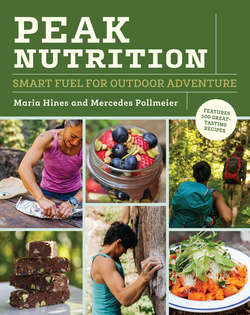Читать книгу Peak Nutrition - Maria Hines - Страница 8
На сайте Литреса книга снята с продажи.
ОглавлениеINTRODUCTION
To be a great climber, you must exercise the discipline required to know yourself.
—Mark Twight, Extreme Alpinism
BACK IN THE DAY, ALL HUMANS HAD TO do was find food, water, warmth, and shelter; seek safety; and make sure they reproduced and felt part of a tribe. Food and water was (and still is) the foundation if you want to live. Everything else is built around that. Although stress during those times was acute, they needed to worry about only those foundational things.
These days, stress is abundant, and food is one of the last things many people think about, at least in most industrialized countries. Instead, they stress about their job, whether their boss likes them, what people think about their Instagram story, how they’re going to survive traffic and work deadlines, if anyone will notice what they’re wearing, and so on. Today’s modern Western lifestyle poses a set of unique and ongoing stressors and expectations, especially for mountain athletes. Whether you are a climber, a boulderer, a trail runner, a backcountry skier, or a mountain biker, if you want to perform outside, start making food your number-one priority and get real with your stress levels.
In this comprehensive guide, we have cut through the junk and provided the best, most up-to-date information on making delicious, nutritious food a focal point of your athletic life. This book is about knowing yourself, changing what you want to change, and working on your health and well-being through peak nutrition. It covers training and recovery, eating, cooking, building good habits, sharpening your relationships, and more. Apply these simple ideas and see great results—you just have to trust the process. We hope to inspire you to be the best outdoor athlete you can, by being the best version of you.
KNOW THYSELF
Humans evolved to hunt for food to support movement and the tribe. This is the basis of human nutrition, and it falls on a spectrum. No nutrient is good or bad; the dosage determines the poison, which is true of all things—training, work, socializing, media usage, and so on. Some nutritional strategies lead to suboptimal performance and a shorter path to death than others. You are reading this book because you want to optimize your nutrition, you want to live longer and healthier, and you want to perform better and smarter.
Here’s the thing: Nutrition is in its alchemy stage compared to science, which is why it’s so hard to definitively know what is right and what is wrong. The only way to know what works for you is to experiment for yourself. We could keep researching for decades and still not understand what optimal nutrition is for everyone. Everyone has a different culture, experience, age, microbiome, metabolism, and movement. But we each can get a good idea of what works for us, and you can too by using the simple ideas presented in this book.
The goal is to understand your body better, to know thyself. That is why we dive deep into specific topics. Enjoy the process of tinkering with your own nutrition. Think of it as a craft, something to master. Maintaining peak nutrition and cooking to support it are skills that will take time and effort, but the result will be well worth it. Your body is a temple, a well-adapted organism to be grateful for. The second your health and well-being are taken away, you’d do anything to get them back. As you read this book and start to experiment with your own nutrition and set new goals, remember these key tenets:
Be self-compassionate. “I yam what I yam,” to quote Popeye. You are who you are! You can learn new tricks and improve on poor nutrition habits. Don’t get sidetracked by what other people say or do. Do YOU. Continue to be motivated and inspired by being self-compassionate. Being self-critical does nothing for you. Take Dr. Kristin Neff’s self-compassion test at https://self-compassion.org. How did you do?
Be real with yourself. Being self-compassionate doesn’t mean you can let yourself off the hook. Sometimes you need a mirror to really look at yourself, inside and out, to see areas for improvement. Don’t be afraid—change is incredible! You don’t have to be perfect. Good is good enough. You can break the rules sometimes because, well, you’re human. Striving to be perfect will only lead to more disappointment. You can change if you want to, but it takes work. The brain has a fantastic way of changing neural patterns. Thanks to this neuroplasticity, you can learn novel skills, change thought patterns, and form awesome new habits. But it takes reps—lots of them.
Be critical in your research. There is a lot of information out there on performance and sports nutrition, and many people are ready to take your money. Be critical about the information you’re consuming. Make sure it feels right, then start the process and take action.
